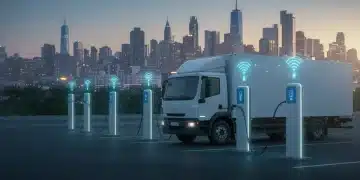Government incentives for electric truck fleets: what you need to know

Government incentives for electric truck fleets include tax credits, grants, and rebates, which help businesses offset costs and promote sustainability while addressing challenges like high initial expenses and charging infrastructure.
Government incentives for electric truck fleets are reshaping the logistics industry. Have you ever wondered how these incentives can affect your business? Let’s dive into the details.
Understanding the benefits of electric trucks
Understanding the benefits of electric trucks is essential for businesses looking to innovate and save costs. Electric trucks are not just eco-friendly; they also bring several advantages that can transform logistics.
Cost Savings
One of the most significant benefits is the potential for cost savings. Electric trucks generally have lower fuel costs compared to diesel. This means businesses can allocate their funds to other critical areas.
- Reduced fuel expenses
- Lower maintenance costs
- Potential tax incentives
Environmental Impact
Another key benefit comes from the reduced carbon footprint. Electric trucks emit zero tailpipe emissions, which contributes to better air quality. Companies adopting these fleets can improve their public image as environmentally responsible.
Moreover, as more companies switch to electric, this trend encourages others to follow, creating a ripple effect in the industry. This is not just a trend; it’s a shift towards sustainability that impacts our planet positively.
Enhanced Performance
Electric trucks also offer enhanced performance features. With instant torque, they can provide better acceleration, making them ideal for urban environments. Without the noise and vibration of traditional trucks, the driving experience becomes smoother.
Overall, understanding these benefits helps businesses make informed decisions. As the demand for sustainability grows, investing in electric trucks is becoming more appealing.
Types of government incentives available

Understanding the types of government incentives available for electric trucks can help businesses maximize their investment. These incentives can significantly reduce costs and support the transition to greener technologies.
Tax Credits
One common form of incentive is tax credits. These can offer significant savings on the purchase of electric trucks. By reducing taxable income, businesses can invest more in their operations.
- Federal tax credits for electric vehicles
- State tax deductions
- Possible local tax benefits
Grants and Rebates
Many governments provide grants and rebates specifically designed to encourage the use of electric vehicles. These funds can help businesses offset initial costs. Such programs are often targeted toward small and medium-sized enterprises, making them more accessible.
Moreover, some utilities offer rebates for charging stations, further enhancing the financial appeal of switching to electric trucks.
Low-Interest Loans
An additional option includes low-interest loans that allow companies to finance their electric truck purchases at favorable rates. This can ease cash flow concerns and facilitate smoother transitions.
Overall, understanding these various incentives is crucial. They not only make the switch to electric trucks more affordable, but also align businesses with sustainable practices that are increasingly valued in today’s market.
Success stories of businesses benefiting from incentives
Success stories of businesses benefiting from incentives for electric trucks showcase how these programs work in real life. Many companies have made the transition to electric trucks and have seen significant improvements.
Case Study: A Logistics Company
One logistics company adopted electric trucks and utilized government tax incentives. They saved thousands of dollars on their purchase, which allowed them to invest in additional vehicles. Their decision led to lower fuel costs and improved delivery efficiency. The company reported a significant decrease in operational expenses.
Green Transport Solutions
A small delivery business focused on eco-friendly practices also transformed its fleet. By applying for local grants, they received funding to switch to electric vehicles. Not only did this enhance their public image, but it also attracted more environmentally conscious customers. Their growth in sales showed that customers value sustainability.
- Improved customer loyalty
- Reduced environmental impact
- Increased market share
Corporate Social Responsibility
Many businesses have found that adopting electric trucks aligns with corporate social responsibility goals. For instance, a retail company committed to reducing its carbon footprint saw positive feedback from its community. By sharing their journey and success with electric vehicles, they enhanced their brand reputation.
These real-life examples highlight the practical advantages of government incentives. They show how businesses not only save money but also contribute positively to the environment. Exploring these success stories can inspire others to make the switch.
Challenges in adopting electric truck fleets

Challenges in adopting electric truck fleets can pose significant hurdles for businesses considering the transition. While there are many benefits, it’s essential to understand the obstacles that may arise.
High Initial Costs
One of the biggest challenges is the high initial cost of electric trucks. Purchasing these vehicles can be expensive, and not all businesses have the capital to invest upfront. This can lead to hesitation in making the switch.
Charging Infrastructure
Another major issue is the inadequate charging infrastructure. Many areas lack the necessary charging stations, making it difficult for electric trucks to operate efficiently. Without reliable access to charging, companies may struggle to maintain their delivery schedules.
- Limited charging stations in rural areas
- Long charging times compared to refueling
- Potential downtime during charging
Range Anxiety
Range anxiety is also a critical concern. Businesses worry about the distance electric trucks can travel on a single charge. This fear can limit their ability to plan long routes, impacting delivery efficiency.
Moreover, the technology is continually evolving. Companies may feel uncertain about investing in electric trucks that could become outdated soon. It’s essential to carefully consider these challenges as they transition to electric fleets.
In summary, adopting electric truck fleets presents both opportunities and challenges for businesses. While the incentives offered make the transition more appealing, companies must navigate obstacles like high initial costs and inadequate charging infrastructure. By understanding both the benefits and challenges, businesses can make informed decisions and contribute to a more sustainable future. The journey toward electric trucks is not without its hurdles, but the rewards can be significant.
FAQ – Frequently Asked Questions About Government Incentives for Electric Truck Fleets
What are the main benefits of switching to electric trucks?
Switching to electric trucks can lead to lower fuel costs, reduced emissions, and improved company image as a sustainable business.
What types of government incentives are available for electric trucks?
Incentives include tax credits, grants, rebates, and low-interest loans designed to help businesses offset the costs of electric trucks.
What are the main challenges in adopting electric truck fleets?
Challenges include high initial costs, limited charging infrastructure, and range anxiety regarding the distance electric trucks can travel.
Are there any success stories of businesses benefiting from these incentives?
Yes, many companies have successfully adopted electric trucks and reported significant savings and improved operational efficiency through available incentives.





